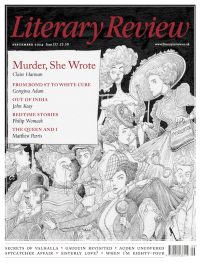Lucy Thynne
My Brilliant Cousin
Mina’s Matchbox (Translated from Japanese by Stephen Snyder)
By Yoko Ogawa
Harvill Secker 288pp £18.99
Mina’s Matchbox is about, and often reads like it has been written for, children. Set in 1970s Japan, the novel is sweet and uncomplicated. Twelve-year-old Tomoko moves in with her uncle while her mother trains as a seamstress. She is enthralled by her cousin Mina, a girl who poses ‘difficult to answer’ questions and is so asthmatic that she has to ride to school on her pet hippopotamus. Together, they obsess over the Japanese beach volleyball team, watch a comet fall and develop crushes on the librarian and the postman.
The novel is narrated by an adult Tomoko. Her year with Mina supposedly forms ‘the very foundation’ of her memory, but little happens. On the surface, the girls’ relationship will feel familiar to readers of Elena Ferrante’s quartet and Yiyun Li’s The Book of Goose. Tomoko is well aware that Mina is smarter, richer and more beautiful than her. She repeats Mina’s literary opinions to impress the librarian but knows she is ‘no more than the messenger’ and not the ‘real beauty’. Unlike in Ferrante’s quartet, though, this relationship does not take on a compelling life of its own. There’s no burning envy, no self-development.
Yoko Ogawa leaves plenty of questions half answered. Why is Mina so ill and might her life be in danger? Why is Mina’s uncle, a charismatic businessman, never there? Mina collects matchboxes, ominous toys for children, but they never produce the kind of spark you might expect. The novel is

Sign Up to our newsletter
Receive free articles, highlights from the archive, news, details of prizes, and much more.@Lit_Review
Follow Literary Review on Twitter
Twitter Feed
Under its longest-serving editor, Graydon Carter, Vanity Fair was that rare thing – a New York society magazine that published serious journalism.
@PeterPeteryork looks at what Carter got right.
Peter York - Deluxe Editions
Peter York: Deluxe Editions - When the Going Was Good: An Editor’s Adventures During the Last Golden Age of Magazines by Graydon Carter
literaryreview.co.uk
Henry James returned to America in 1904 with three objectives: to see his brother William, to deliver a series of lectures on Balzac, and to gather material for a pair of books about modern America.
Peter Rose follows James out west.
Peter Rose - The Restless Analyst
Peter Rose: The Restless Analyst - Henry James Comes Home: Rediscovering America in the Gilded Age by Peter Brooks...
literaryreview.co.uk
Vladimir Putin served his apprenticeship in the KGB toward the end of the Cold War, a period during which Western societies were infiltrated by so-called 'illegals'.
Piers Brendon examines how the culture of Soviet spycraft shaped his thinking.
Piers Brendon - Tinker, Tailor, Sleeper, Troll
Piers Brendon: Tinker, Tailor, Sleeper, Troll - The Illegals: Russia’s Most Audacious Spies and the Plot to Infiltrate the West by Shaun Walker
literaryreview.co.uk